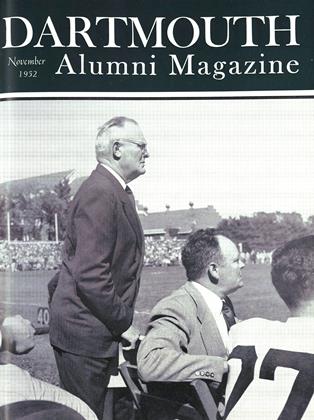By Leonard W. Doob '29. New York: Henry Holt and Company. 1952. Xix, 583 pp. $5.00.
Dr. Doob prefaces this volume with the hope that social psychology may be a useful tool in solving problems of human relations in a period of turmoil. Recognizing that the tool is still in a process of development, he attempts no major synthesis. Instead, he explores some of the major problems concerning the individual in society, the behavior of groups, and social change. Among his topics are socialization, language, communication, ethnic groups, leaders, prejudice, education, and social conflict.
In discussing these issues the author makes liberal use of direct quotations, suitably condensed, and set off in bold-faced type. These passages include statements of many important findings and theories of psychology, sociology and related fields, as well as illustrative materials from such varied sources as a novel and a Sears, Roebuck catalogue.
This form of presentation give's variety and a feeling of first-hand acquaintance with sources, without sacrificing continuity and without overshadowing the major role of the author. The total impression is that of a vividly illustrated series of lectures, in which the constant interplay of individual and social forces is examined from a consistent point of view.
A student reviewer recently remarked that another book on social psychology "turned out to be very interesting when you forgot that it was a textbook." Without overstressing the implications of this comment, we may note that the present volume very successfully addresses itself to the general reader, not only to the captive student. While it is well adapted for class use, it should find a wider audience among those seeking a reasoned and informative discussion of an important field.
 View Full Issue
View Full Issue
More From This Issue
-
 Article
ArticleOn Educational Policy
November 1952 By PROF. ANTON A. RAVEN -
 Article
ArticleThe Business of Being a Gentleman
November 1952 -
 Class Notes
Class Notes1918
November 1952 By ERNEST H. EARLEY, DONALD L. BARR -
 Class Notes
Class Notes1929
November 1952 By F. WILLIAM ANDRES, EDWIN C. CHINLUND -
 Article
Article"The Greatest Sport"
November 1952 -
 Class Notes
Class Notes1921
November 1952 By REGINALD B. MINER, ROBERT M. MACDONALD
Henry S. Odbert '30
Books
-
 Books
BooksAlumni Publications
June 1929 -
 Books
BooksTHE PROBLEMS OF ADMISSION TO COLLEGE
June 1929 -
 Books
BooksThe Land Was Theirs
September 1976 By Alexander G. Medlicott Jr. '50 -
 Books
BooksTHE GEOLOGY OF NEW HAMPSHIRE, PART I — SURFICIAL GEOLOGY
November 1952 By E. D. Elston -
 Books
BooksBURR OAKS,
February 1948 By F. Cudworth Flint. -
 Books
BooksA BRIEF RULE TO GUIDE THE COMMON-PEOPLE OF NEW ENGLAND
May 1938 By Frederic P. Lord, M.D. '98


